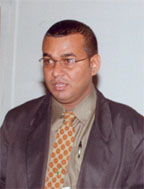aMinister of Agriculture, Robert Persaud on Monday met with a Brazilian delegation at his ministry and it was subsequently disclosed that he will be addressing an international biofuels conference scheduled for November in Brazil.
The Government Informa-tion Agency (GINA) reported yesterday that the Brazilian delegation was led by Ambassador Ruy Nogueira, Under Secretary–General for Co-operation and Trade Promotion.

Meanwhile Persaud will also be touring ethanol production facilities and looking at standards during his visit to Brazil. He would also visit biofuel laboratories and explore areas of co-operation such as technical support and engaging potential investors in the sector, GINA stated.
At Monday’s meeting Persaud highlighted that Brazil is one of the world’s leaders in ethanol production and is having an agricultural export boom since it is the largest exporter of ethanol made from sugar cane.
This sugar cane-based ethanol requires less land, has less ecological impact, and costs less than the U.S. variant which is a heavily subsidized, corn-based ethanol. Brazil is now in the realm of producing biodiesel for trucks and buses.
The development of ethanol has been a major national priority in Brazil since the 1970s, GINA noted. Some 80 to 90 percent of new cars in Brazil operate on flex-fuel which allows them to run on pure ethanol or a mixture with gasoline. And the Brazilians recently passed a historic landmark when the amount of ethanol being used in light passenger vehicles exceeded the amount of traditional gasoline.
The production of liquid biofuel can also be used by small farmers to produce energy for their agricultural machinery and generate their own electricity, especially those in isolated areas. Small farmers could also benefit from better prices for their produce if they were properly incorporated into the agro-fuel production chain.
GINA further said that the Brazilian delegation also included Minister Clementne Baena Soares, Director of the Department of South America–ll of the Brazilian Ministry of External Rela-tions, and representatives from the Brazilian Agricul-tural Research Corporation (EMBRAPA), the National Service of Industrial Instruc-tion (SENAI) , the National Fisheries Secretariat, the Brazilian Co-operation Agen-cy and the Brazilian Post and Telegraph Corporation (ECT).





